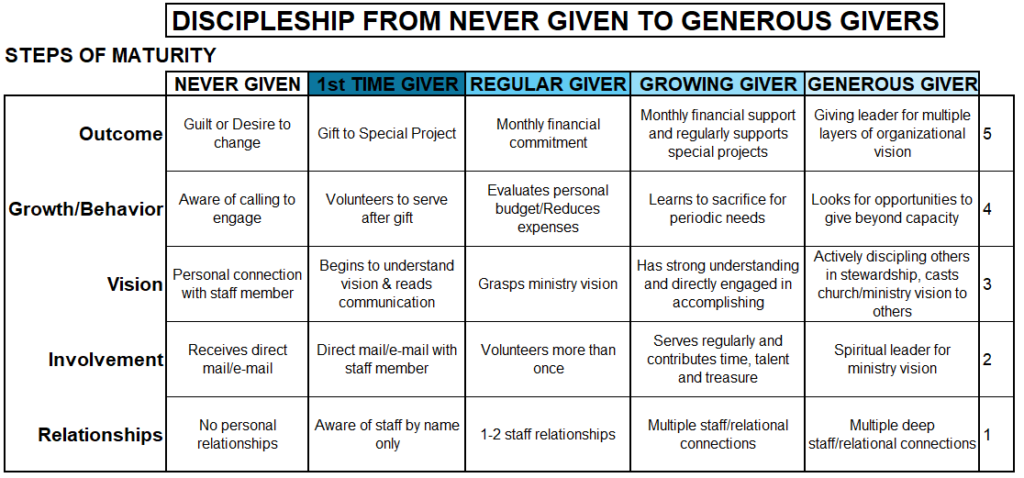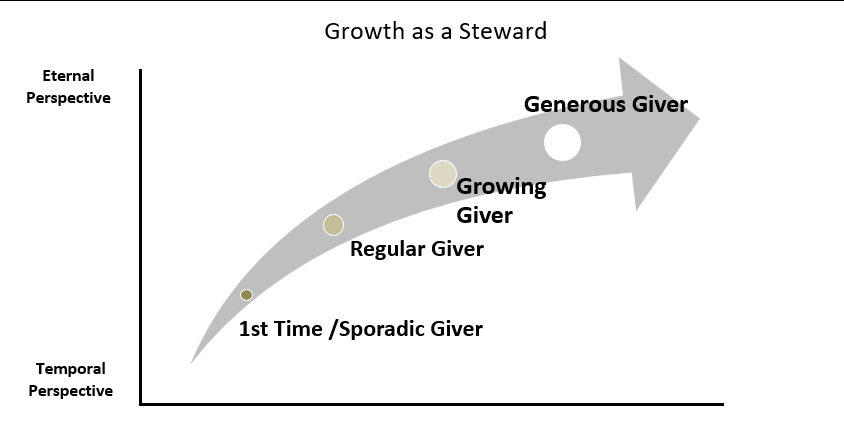Stewardship is the foundation of a healthy church culture.
Being a steward is not synonymous with stewardship. Most churches and leaders have stewardship campaigns, but they talk about stewardship as if it were merely an activity or a single topic of study. This typically results in a short sermon series every other year, or, worse yet, a period of intense focus before the launch of a fundraising campaign that is then dropped until the next financial need arises.
As a result, a 2022 study from the Barna Group reveals, 79 percent of adult Christians are not giving 10 percent of their income to their local church. In addition, consumer debt hit an all-time high of $17.2 trillion in 2023. These sobering statistics reveal the challenges that followers of Christ face as stewards; Dr. Wesley K. Willmer states in Revolution in Generosity that “most don’t believe they ever could give 10 percent, and do not possess the practical knowledge on how to get there.” In other words: what we are teaching is not working.
Embracing a Personal and Comprehensive Approach
To change church members’ mindsets and behavioral patterns, we must begin with the fact that a steward is a person, a manager of someone else’s resources—it is personal. Most followers of Christ will acknowledge that they have this role, yet deep down they struggle with faithfully carrying it out. In Romans 12:1, the Lord calls us to a life of complete commitment to him by urging each of us to offer our bodies as living sacrifices.
The idea here is that we are “all in,” in all areas of our lives, so we must ask ourselves and our church body if any parts are not completely surrendered to, and under, the lordship of Jesus Christ. Too often the part that is not surrendered is the stewardship of the time, talents, and treasures entrusted to us by God. We see an example of this dichotomy in Luke 18:18–23 when a certain ruler asked Jesus how to inherit eternal life. Though in the eyes of men, he was a good person, his possessions owned him; for him, behavior modification was neither his salvation nor his solution. He needed a new heart. He needed to be God’s steward, not simply to manage his belongings better.
When people fully embrace their role as stewards, become equipped, and begin to grow, every area of ministry is impacted. Do we need volunteers to serve? How can we encourage more people to reach out and share the gospel? Do we need more leaders? People will not step up consistently, as a way of life, until they understand and embrace their role as stewards. Do we want to see generous and cheerful givers? That, too, will not happen until our congregations embrace their roles as stewards and become equipped with the tools and practical resources to grow.
Igniting a Steward Culture
This process begins with acknowledging where we have fallen short. In 5 Reasons Why People Aren’t Giving in Your Church, Casey Graham writes that “people feel like the church wants something from them, not for them.” Because of the lack of trust and transparency that has been created in many churches, a steward culture must be intentionally pursued and fostered over time.
The first step is to stop viewing stewardship to get something from our congregants and start viewing it as each person’s journey to becoming a better steward. What other topic in Scripture has become more sacred and personal than how we use our money and resources? We often feel as though it is our God-given right not to share where we are and how we need to grow in this area. Scripture encourages us to give quietly and with the right motivation, but it never says that we are not accountable for our giving. Leaders must lead by teaching and modeling what they want to see in others before expecting to receive it.
Live in Community
As the many examples of public figures taken down by addictions and sinful behaviors show us, the worst thing we can do is live the Christian life in isolation and try to rely on our own conclusions about where we stand spiritually and where we need to grow. The Bible calls us to live in community, to confess our sins to one another, to encourage each other, and to hold each other accountable—that includes our role as stewards.
Unfortunately, the Enemy has done a great job of suppressing this topic, and the steward culture war seems to have been all but lost. Ideally, a church will possess a culture where the role of a steward is modeled, defined, and understood from a scriptural viewpoint and embraced as a life-long calling by every member. Encourage regular, everyday discussions about stewardship and enforce accountability to foster the growth of this culture.
What does it look like on a practical level?

It starts with us (Luke 6:40)
If we as leaders have not studied the Scriptures well and are not personally modeling the role of steward, we will have difficulty casting the vision and challenging others to do the same. Jesus Christ set the ultimate example of stewardship and generosity, and he challenges us to conform to his image. Since so many of the parables of Christ teach about stewardship principles, they are a great starting place for study. With the goal to “spur one another on to love and good deeds” (Hebrews 10:24), leaders can share personal stories that demonstrate how they steward their time, talents, and treasures on a day-to-day basis to encourage and challenge others to do the same.
Educate our constituents (Hosea 4:6)
Randy Alcorn writes in The Treasure Principle about many churches and ministries having a “don’t ask, don’t tell” policy when it comes to discussing finances. Because many leaders view money as a taboo topic, they are not comfortable discussing, communicating, or encouraging accountability in this area of spiritual maturity. When is the last time you had an article in your church or ministry publication about the spiritual basis of stewardship? When we write appeals for support, do we view it as an opportunity to educate about the spiritual themes of our role as stewards and discipleship? In other words, do we educate or ask for money?
The table below outlines one approach for churches to educate their constituents.
| VENUE | PURPOSE | CONTENT/TOOLS |
| Ongoing prayer/stewardship team | Laying the groundwork and setting the example | Church leadership, existing cheerful givers, and faithful stewards |
| Pulpit | Cast vision, teach biblical basis, foster unity and understanding | Model, sermons, testimonies/videos, challenges for growth, brochures |
| Sunday School | Deeper study, Q & A | Share the vision and core value of the role of stewards before God, solidify commitment |
| Small Groups | Study and personal application | Devotionals, confessions, accountability, opportunities for application |
| Seminars/workshops | Further education/equipping | Biblical stewardship, personal finance/budgeting, planned giving |
| Newsletter | More vision, powerful testimonies, and stories | Written by pastor and ministry leaders |
| Newcomers Class | Share vision and core value of the role of stewards before God, solidify commitment | Condensed but clear vision, motivation, and purpose, and stewardship covenant |
Develop partners in ministry (Matthew 28:19)
When we realize that our role as stewards is to help transform hearts to be like Christ, then it becomes clear that this is really about discipleship. A commitment to disciple others is not easy, nor is it ever limited in focus. Jesus spent three years with his disciples and lovingly taught them about every aspect of life. He spoke regularly about their commitment to God and about how that commitment impacted every aspect of their lives, including the stewardship of their time, talents, and treasures. If we are not careful, a specific need, project, or ministry may become the sole focus of our ministry and cause us to neglect the spiritual lives of the lay leaders who make those projects happen.
Sadly, we begin to view our relationships to an end instead of a viable way to love and minister to them. Sometimes we convince ourselves that ministering in this way is not our gift, and we never attempt to learn and grow in stewardship. We often delegate or avoid this responsibility, resulting in our continued failure to engage others in this area of discipleship.
Developing partners in ministry requires intentional planning and a pathway or plan of discipleship. Below is an example of a discipleship pathway to disciple steward leaders. We must continue to realize that everyone is individual and unique and that it is God who transforms lives; however, it is our role to offer a plan that provides direction for those under our care. The path below outlines a way for leaders to cast the vision of growth and progression in an area of spiritual growth that needs to be clarified and understood.
Sample Path to Disciple Steward Leaders

Love individuals with a love that binds (1 Corinthians 13:2)
Authentic, loving relationships will break down barriers to igniting steward leaders. As leaders, our first priorities are to love God and to understand that everything belongs to him. God’s grace calls us to ministry, and we show our love and worship by recognizing and trusting that He provides for every need.
The next priority is our relationship with those we are disciplining. People quickly figure out if we genuinely love and care for them, or if we only see them as dollar signs or what they can offer us. Developing loving relationships with others takes time and effort as we get to know about them, their families, their prayer needs, and how to be a part of their spiritual growth. Our spiritual conversations should include the topic of stewardship, and what it means to be a good steward. We should determine how we can help each other grow in this area, as well as how and when we will approach each other for accountability and growth. These authentic conversations will allow us to grow in respect and Christ-like love for one another.
